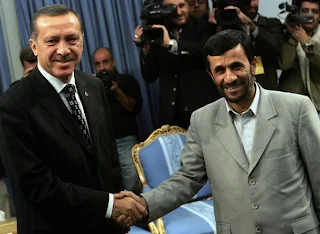Erratic Turkey partly reflects its internal struggle
Actually, if the goal pursued by Turkey might have been rather clear when the AKP first took over the power, the discrepancies within the Turkish government gradually made it quite puzzling. Since Ahmet Davutoglu started shaping his country’s foreign policy, he has claimed to implement a neo-Ottoman vision. Basically, this renewed imperialism considers that any area that was once encompassed by the Ottoman Empire must “enjoy” a privileged relationship with Turkey[1]. Therefore, Turkey tried to appease the problems it has with most of its neighbors – the tentative improvement of its relation with Armenia having been a kind of failed litmus test – and even to intervene as an “honest broker” aiming at solving regional disputes through its supposed Ottoman-old regional knowledge. Turkey actually and successively – if not successfully – imagined mediating Israel and the Palestinian authority, Israel and Syria, Armenia and Azerbaijan or even Lybia and the West.
| Davutoglu and Erdogan: Competing vision for Turkey |
Clearly, both visions stem from the usual strong Turkish nationalism, as was the case for Kemalism, and they are both supported by Turkey’s impressive economic record however fragile the ground of this economic growth may be[2]. Nevertheless, Erdogan’s and Davutoglu’s Ottoman daydreams for Turkey are probably quite different: the former – sometime nicknamed the Caliph of Istanbul or the Padishah – probably imagines a kind of Islamic empire centered on and ruled by Turkey whereas the latter rather thinks of Turkey as a mini-superpower with its feudal influence zone[3].
Many problems with all neighbors
The net result of these competing visions is the apparent inconsistency of Turkey’s foreign policy, and more than this supposed inconsistency, its limits. From 2002 to now, Turkey successively turned its attention to the EU, Russia and Eurasia in the aftermath of the Georgian conflict and to the Middle East since the Davos row.
Actually, as relations with the West were cooling down because of the EU prospect’s fading away and of the renewed Islamic trend of its society, Turkey embarked upon a kind of energetic flirt with Russia before realizing that, while Moscow could clearly take advantage from this momentum, it was mainly a trap regarding its own emancipation dream: Ankara depends already on Russia for most of its gas and for a sizeable part of its oil. Moreover, incentives of a role in South Caucasus or of a path through Central Asia though South Caucasus appeared to be mainly illusive given the Russian control on these areas.
 |
| Turkey and Iran: past or future honeymoon ? |
Those who admire Erdogan will probably term this borderline posture as clever whereas the others will find it confusing. Whatever its intent, the actual outcome of this diplomacy is the increased mistrust with which various players – from the US to the Hamas, from Iran to the EU and Russia – are now considering Turkey. The mere fact that Davutoglu had recently to hammer home that the “no problem with neighbors” policy is successful demonstrates how dubious this affirmation is[5].
Turkey part of the problem, not of the solution
However, if we put aside both Erdogan’s gesticulations and the apparent contradictions of Ankara’s diplomacy, we must recognize that Turkey succeeded in reaching the “strategic depth” aimed by Davutoglu.
His country is no more under US dominance and it is actually uncontrolled and uncontrollable. As a crazy weathercock, this Turkey could be equally a threat for Iran, for Israel, for Syria, for Armenia and for Europe, as shown by the recent menaces sent to Cyprus over the Mediterranean drills. Therefore, in this inflammable region, Western leaders would be well-advised to avoid conferring any mediation role to Turkey because it could be both ineffective – Turkey is not necessarily seen anymore as a reliable partner by other Muslim countries – and dangerous as it would benefit only to the reinforcement of this changeable country.
| Challenging the international community: Erdogan and Sudanese leader Al Bashir prosecuted by the International Criminal Court (Sept. 2011) |
< Back to Part 1
[1] A “privilege” which is variously felt by its recipients. According to cable ANKARA 00000087 005 OF 006 disclosed by Wikileaks, Ambassador Jeffrey noted that “Finally, not all of the ex-Ottomans look with fondness on their past under the Pashas, or yearn for Turkey's return”. For a quite comprehensive analysis of the first cables series disclosed by Wikileaks on Turkey, read (in French) “les fuites américaines mouillent la Turquie”, Eurotopie, January 2011.
[2] The fundamentals of Turkey’s economy are variously appraised. See for instance “Instant obsolescence of the Turkish model”, Asia Times, August 2011.
[3] Not to speak about the difference of personality. Read “les fuites américaines mouillent la Turquie”, Eurotopie, January 2011.
[4] A position than has just been restated by Turkey despite the recent cold with Iran. Read “Erdogan Reiterates Turkey-Iran Cooperation in War on Terrorism”, Fars News Agency, 09/27/2011.
[5] “Turkey's Davutoglu says zero problems foreign policy successful”, Today’s Zaman, 09/18/2011.
[6] Armed Forces Journal. The maps published in this article are now available on Wikipedia.
Commentaires